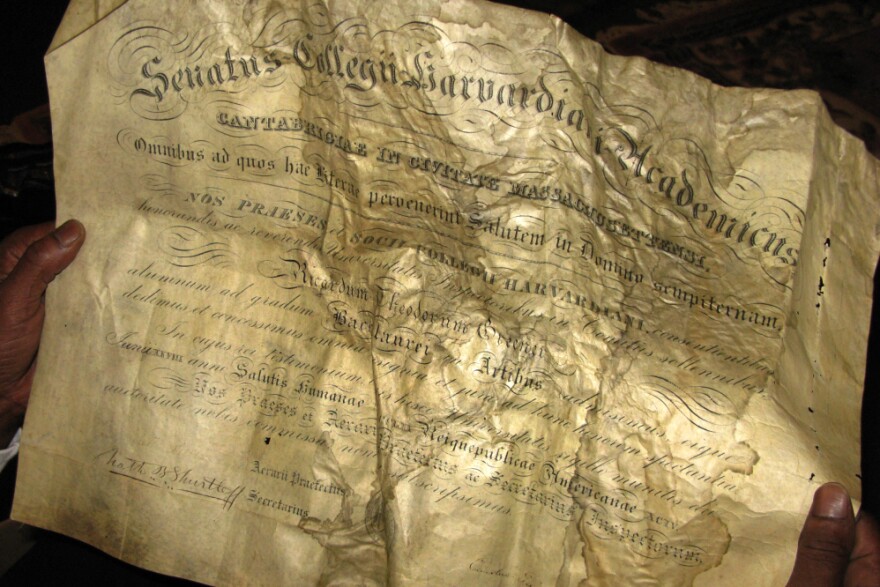Three years ago, just moments before sledgehammers ripped through an abandoned home in Chicago, the head of a demolition crew decided to save the contents of an old steamer trunk stored in the attic.
"They were about to demolish it because they couldn't get it down the stairs," says Rufus McDonald, who gathered what was inside the steamer trunk — documents and old books — and took them to a rare-book dealer in Chicago.
"He said, 'Do you know who this is?' I said, 'Nah, who is it?' He said, 'It's Richard Theodore Greener," McDonald recalls. "I said, 'Who is he?' "
Greener, a gifted intellectual who was as prominent in his day as Booker T. Washington, W.E.B. Du Bois and Frederick Douglass, was the first African-American to graduate from Harvard University. Historians call the discovery a wonderful find.
In his living room, McDonald carefully unrolls scrolls of papers — a diploma, a law license and other documents written in Latin and Russian — that he found in the abandoned house.
Greener graduated from Harvard in 1870. It was unheard of for a black instructor to teach at a Southern university, but during Reconstruction, Greener earned a law degree from the University of South Carolina and then taught there. Greener also served as dean of Howard University's law school and as a diplomat in Russia.
"His entire life he remained a famous commentator on race relations," says Michael Mounter, an archivist at the University of South Carolina.
Greener also worked with the Republican Party to secure what was then called "the Negro vote" and gained prominence as a spokesman for blacks, according to Mounter. He disagreed with Frederick Douglass over whether freedmen in the South should migrate West. When he retired in Chicago, he continued to tour and lecture. Mounter says that although Greener was a major figure during his own time, he didn't have the lasting impact of other black leaders.
"There were several times in his life where you almost get the feeling he sensed there was an opportunity to do something really important, but for whatever reason — whether it was his own flaws or failings or circumstances — that he just never quite was able to make that lasting impact on race relations," Mounter says.

Even so, historians say Greener was an important figure. They call McDonald's discovery exciting and wouldn't mind having the papers. Evelyn Brooks Higginbotham, the chairwoman of Harvard University's Department of African and African American Studies, says the school already has photos of Greener, but there would surely be some interest in acquiring the diploma.
In Washington, Lonnie Bunch, the director of the Smithsonian's Museum of African American History and Culture, says he could envision the Greener documents at the museum, which is being built now and is scheduled to open in a few years.
Greener's story "would add to our understanding of black commitment to education, the ability to sort of leverage his education as a diplomat in the 19th century," Bunch says.
Back in Chicago, Carol Adams, president of the DuSable Museum of African-American History, adds a bit of historical perspective.
"Perhaps without a Greener we wouldn't have had a Barack Obama having graduated from Harvard Law," she says.
Rufus McDonald says he's talked to plenty of people, including archivists and other experts, about the value of what he's found, but he's been disappointed so far in their offers. He says he can't afford to donate the documents, so he's looking for a buyer with deep pockets.
And McDonald says from what he's learned, if Richard Greener had not ended his career in Russia, "without a doubt, he definitely would have been in the history books. These documents are going to bring his legacy back."
Copyright 2021 NPR. To see more, visit https://www.npr.org.




